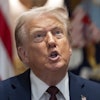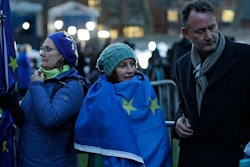BRUSSELS (AP) — European Union leaders meeting for a Brexit summit are likely to grant Britain a short extension, German Chancellor Angela Merkel said Thursday, if the U.K. government can win parliamentary support next week for its divorce deal.
But the early signs of that happening were not good. British Prime Minister Theresa May angered many legislators with a televised speech late Wednesday blaming a divided Parliament for an impasse that has left Britain eight days away from crashing out of the bloc. One lawmaker slammed her remarks as "toxic."
May has a tough day ahead as she arrives in Brussels to lobby her European partners to extend the Brexit date from March 29 until June 30 to push through the agreement she reached with the EU in November.
Her deal has been roundly rejected twice by the U.K. Parliament, and EU leaders are being asked to take the risk that May can convince the lawmakers next week.
That looked more uncertain after her speech on the eve of the summit, in which May told a Brexit-weary public: "You want this stage of the Brexit process to be over and done with. I agree. I am on your side."
May accused lawmakers of "infighting, "political games" and "arcane procedural rows," but acknowledged no personal role in creating the impasse.
Many lawmakers, including from some in her own Conservative Party, condemned the tone of her speech.
Anna Soubry, of the breakaway Independent Group, described it in a tweet as the "most dishonest and divisive statement from any Prime Minister." David Lammy of the opposition Labour Party called the speech "sinister," while Conservative Sam Gyimah called May's comments "toxic" and a "low blow."
But Foreign Secretary Jeremy Hunt said May was simply expressing frustration and tapping into the public's exasperated mood.
"In fairness, what she is actually saying is that we have to implement the results of a democratic referendum," he told the BBC. "That's the challenge."
May's opponents, and EU officials, say her refusal to budge on her rejected deal is pushing the country to the brink of a catastrophic no-deal scenario, with huge political and economic implications for Britain and the EU.
Merkel vowed to work "until the last hour" to try and ensure that Britain doesn't leave without a deal, even though her government has already put "the most important emergency measures" in place to deal with such a scenario just in case.
"We will, despite these measures we have taken, work until the last day — I will say until the last hour — to ensure that this emergency planning doesn't come into effect," she said. "We will do everything in the remaining, admittedly few, days to achieve an orderly, joint solution."
Merkel told German lawmakers Thursday that "we can comply in principle with this request if we were to have a positive vote next week on the withdrawal documents in the British Parliament."
But she warned that the EU wants to ensure the legitimacy of the May 23-26 elections to the European Parliament. European Commission President Jean-Claude Juncker has said that the Britain should be out before May 23 or be obliged to take part in the Europe-wide vote.
EU officials fear that citizens unable to vote could launch legal action at the European Court of Justice, or that businesses unhappy with legislation adopted by the new parliament might challenge its legitimacy.
Lithuania's president, Dalia Grybauskaite, said the EU "will certainly be inclined to help (May) to talk to the U.K. Parliament," she said, and that "we will definitely approve (an extension)," the Baltic News Agency said, citing Lithuanian radio.
Should May fail, EU leaders could be forced to meet again next week on the eve of Britain's departure to weigh their next move, with a much longer extension a possibility.
May said Parliament faced a "final choice" between her deal, a no-deal departure and cancelling Brexit.
But what remains unclear is exactly what happens next. Hunt said he did not know if May's Brexit deal will be brought back to Parliament next week, as he warned of "extreme unpredictability" if the issue is not resolved.
Main U.K. opposition Labour Party leader Jeremy Corbyn was also meeting senior EU officials in Brussels, trying to persuade them that Parliament can find an alternative to May's rejected plan.
"I believe it should be possible to agree a deal with the EU that secures a close economic relationship before the European Parliament elections," Corbyn said.
___
Geir Moulson in Berlin, Danica Kirka in London and Jan M. Olsen in Copenhagen, Denmark, contributed to this report.






















